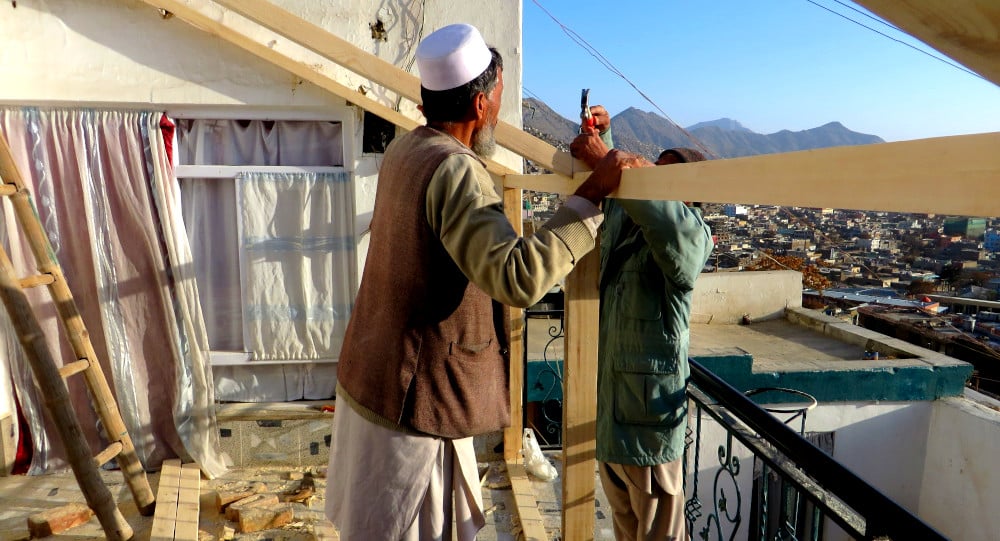Kabul Green Homes
Kabul Green Homes Project draws on the experience and best practices acquired during the implementation of AFG-TAJ project implemented in Afgahnistan and Tajikistan funded by AFD. It applies solar passive and energy solutions in 15 districts of Kabul City where the housing, heating and pollution problems are most acute.
Context and challenges
Kabul has seen a major influx of population in the last decade peaking from ca. 1 million to 5 million inhabitant in 2018. Despite the security context but also because of the impact of decades of war on the infrastructure, construction and re-construction have been booming to meet the growing demand. While Kabul housing sector encompasses traditional houses built of mud and straw together with modern buildings made of reinforced concrete or sometime a mix of both, the energy efficiency concern is largely underrated in the planning and construction of building.
This could seem paradoxical given the harsh and long winter the capital faces and the relative cost of energy for most families. As direct consequences of this situation, health issues rise due to thermal discomfort, economic vulnerability and energy poverty increase for households and, last but not least, air pollutants level rise to critical levels for all Kabul inhabitants. Indeed, more than 90% of low- to middle-income families use biomass (wood,coal, dung, sawdust,etc.) for heating purposes in largely inefficient stoves, putting pressure on natural resources and dramatically decreasing air quality inside their houses but also city-wide. (Source: Social Energy Assessment of Domestic Energy Practices (SEADEP) 2014 & baseline study KGHP 2016)
The levels reached in winter have qualified Kabul as one of the most polluted capitals in the world and Afghan Government has highlighted air pollution as second biggest challenge after security related matters.
Electricity cannot be seen as a short to medium term solution for heating because of limited connectivity to the grid for a significant part of Kabul population, a very high cost and limited structural availability in winter (low production or import of regional hydropower). On the civil society scene, the overall people awareness on climate change and environment issues is fairly very low but however action can be built on a limited number of organisations active in the energy efficiency sector and a larger network of active NGOs and agencies working in the renewable energy and environment protection sectors.

The project
The “Scaling up green homes in Kabul towards sustainable energy consumption and low emission development”, more simply named Kabul Green Homes Project is a four year initiative, implemented by Geres, in partnership with Afghan NGOs, Rural Movement Organization and Afghanistan Microfinance Association, in close collaboration with Kabul Municipality.
With broader objective to produce large-scale and market driven Energy Savings Solutions (ESS) and ensure uptake of their consumption by individual households in Kabul, the project intends to contribute to :
- Economic growth by supporting SMEs, business intermediaries and entrepreneurs
- Poverty reduction by targeting vulnerable households, in a fragile position in regards to energy poverty
- Climate change mitigation & Adaptation by promoting Energy Savings Solutions in Kabul and beyond as a good practice for other cold climate areas in the neighbourhood regions.
The typical Energy Savings Solutions promoted by Geres and its partners range from solar passive verandas, thermal insulation packages, improving local kitchens, renewable energy solutions such as biogas digesters and solar cookers.
With 15 months of arduous work remaining, KGHP so far reached those key results:
- More than 4000 houses are equipped with energy saving solutions
- 132 small and medium enterprises or craftsmen are trained and 79 are actively engaged in ESS disseminations
- 700000 people of targeted areas are informed of ESS and project through awareness campaign
- A specific Green loan design and system has enriched the product portfolio aimed at microfinance institutions (MFI), to date, two MFIs provide green loan and 10 SMEs have been granted loans totalling 2461000 Afn (equivalent to 31551 USD)
- A business intermediary, the Solar House Technician Association is supported on governance and business development for further uptake of the solutions after completion of the project.
Partners
Implementing partners
KGHP is implemented by Geres together with its Afghan partners the Rural Movement Organization (RMO) and Afghanistan Microfinance Association (AMA) in collaboration with Kabul Municipality in 15 urban districts of the capital
Financial partners
European Union, SWITCH ASIA Sustainable Consumption and Production programme and French Agency for Development (AFD)
WOULD YOU LIKE TO TAKE ACTION
AND SUPPORT WHAT WE DO?
Tell us who you are and find your means of action.
